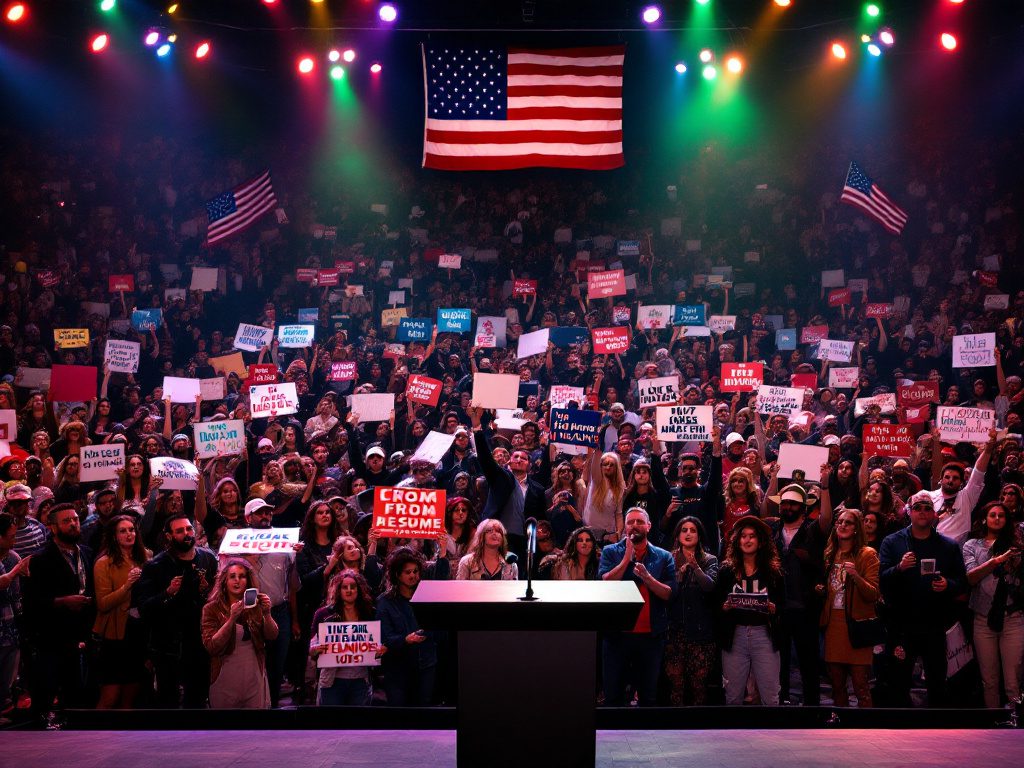The CNN Conservative: A Performance or a Turning Point?
Crowds flooded into Warren, Michigan for President Donald Trump’s first major rally of his second term—a brash, electric spectacle heavy on the personality politics that have, for better and for worse, come to define the American right. Against the backdrop of Trump’s self-congratulatory celebration, a peculiar moment unfolded when Scott Jennings, the lone conservative torchbearer at CNN, joined Trump on stage to serve up what many critics interpreted as red meat for the MAGA faithful.
In a now-infamous soundbite, Jennings declared, “When you own as many libs as I do, you gotta get a place to put them all,” joking about needing a farm in Michigan, his words earning a raucous response from the crowd. The commentator’s embrace of this caricature—right-wing pugilist basking in ‘owning the libs’—might seem like just another rally punchline. But a closer look reveals something deeper: the ever-blurring boundaries between political entertainment and serious governance, and the willingness of mainstream institutions like CNN to prop up contrarian voices in the name of ‘balance,’ even as the national stakes remain starkly real.
What makes Jennings’ performance remarkable isn’t just his bravado but the context: CNN has rewarded his visibility, recently granting him a lucrative extension despite declining his request for his own show, according to a DailyMail report. His ascent illustrates how the role of the media in our democracy is evolving—sometimes for the worse. While the narrative of the “conservative black sheep at a liberal network” is lucrative for ratings, it is less clear what it delivers for civil discourse or for the millions of Americans caught in the crossfire of partisan spectacle.
Media, Messaging, and the Meaning of ‘Owning the Libs’
Let’s not kid ourselves: the phrase “own the libs” is neither clever nor constructive. As Pulitzer-winning historian Nicole Hemmer notes, such rhetoric “is ultimately about scoring points, not fostering solutions.” Conservatives leveraging cultural grievance and hyperbole—especially in regions battered by policies like Trump’s own tariffs on car parts and the pandemic’s economic fallout—can evoke laughter at a rally. But does it help the people of Michigan, whose auto industry faces both domestic policy headwinds and relentless global competition?
According to Bureau of Labor Statistics data, Michigan lost more than 8,000 auto manufacturing jobs in the past 18 months, much of it linked directly to Trump’s ongoing tariff regime. Yet, at the Warren rally, these cold economic realities were overshadowed by the kinetic spectacle of conservative pundits and administration officials trading jibes about media bias and liberal fragility. This is political theater, and for those seeking actual policy discussion, the spectacle often substitutes for substance.
“The rally was less about job creation or immigration reform and more about who gets to ‘win’ a media argument. That’s not leadership—it’s stand-up comedy masquerading as governance.”
Jennings, as a Republican strategist and former George W. Bush adviser, is savvy enough to know the difference between public policy and performative antagonism. Yet his value on CNN (and at the White House rally) is precisely his willingness to play the part—a fact not lost on the crowd, the cameras, or the president himself, who half-joked about Jennings risking his TV gig if he “goes too far.”
The Chilling Effect of Performative Politics
Name a time in recent history when performative contenders and media personalities have commanded as much attention as actual policymakers. The Trump rally provided a microcosm of this troubling trend. With alt-right figures like Stephen Miller and communications aides joining Jennings and Trump onstage, policy took a back seat to bravado. Trump didn’t miss a moment to praise his inner circle or mock his detractors, underscoring his administration’s reliance on electoral spectacle over hard-nosed governance.
This is no isolated incident. According to a Pew Research Center study, more than 60% of Americans believe the proliferation of “hot takes” and ideological grandstanding on cable news is directly harming substantive debate. “Americans are desperate for leadership but often end up with talk show theatrics,” Harvard political scientist Dr. Sandra Liu notes. “It undermines trust in institutions and mutes real policy progress.”
So what comes next? Jennings, now courted as a possible Republican contender for Mitch McConnell’s Senate seat, embodies this new breed: media-savvy, unapologetic, and willing to trumpet anti-liberal sentiment as a platform. The question for voters in Michigan—and beyond—is whether such showmanship offers solutions, or simply distracts from the hardships of everyday life. Will Americans demand more, or are we destined for a politics of viral bravado over visionary change?
If our democratic culture holds any hope, it must be in the recognition that leadership demands more than punchlines. The stakes for working families, displaced employees, and divided communities are far too high for all-American governance to devolve into a laugh track. Our challenges demand empathy, nuance, honesty—and a media ecosystem willing to do more than reward the loudest voices in the room.

